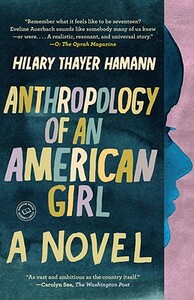You need to sign in or sign up before continuing.
Take a photo of a barcode or cover
Great, yet bittersweet book. Everyone will see bits of themselves and others they know-especially the parts we try to overlook. Deep thought has been put into this story. Read at your own rish & betterment.
It could have been good but it needed a massive revision and the page count be cut in half. Most of the book was boring.
To be honest, I couldn't get through this book. The writing was mediocre at best, and the plot did not capture or hold my interest. There were glimmers of interesting elements, but it needs a lot more editing than it got before it's truly workable.
Couldn't even finish it and I HATE not finishing books. Trite and undeservedly self important.
When I first picked up "Anthropology of an American Girl," I approached it with sarcasm. A friend of mine had joked about developing an American Studies class about the elusive American Girl. My response to him was that Hilary Thayer Hamann’s book could potentially be the textbook. After reading Hamann’s work, though, I am flabbergasted and regret my prior scoffing.
Anthropology of an American Girl majestically follows the life of Eveline, starting with the summer before her senior year in high school. Her narrative addresses changing friendships, true love, money, and death as she struggles to remain honest and true to herself in 1970s and 1980s New York. Even though it sometimes seems as if anything and everything happens to Eveline, the artistic abstractness of Hamann’s writing allows the reader to still connect and resonate with some experience of Eveline’s. Whether you are a young woman entering adulthood, feeling lost in the whirl of life, like Eveline, or a mother, father, boyfriend, brother — everyone can either relate to a part of Eveline’s story or recognize the women in their life in the narrative.
In part, I see these personal connections arising out of Hamann’s writing style. Although she clearly sets forth a scene and emotion, her way with words and imagery leave more than enough space for a reader to step into the story. Nothing is concrete, and perhaps Hamann writes this way on purpose to bring light to the lack of clarity in life. Maybe I am over-analyzing, but either way I noticed the vagueness and abstractness of Hamann’s style from the beginning.
It is beautiful.
Also, if Hamann’s writing in any way reflects the way she perceives the world, I would love to talk with her over coffee. She easily captures the double standard that girls are held to and the ways in which society produces liars, starting with the phrase “Boys will be boys” (28). Hamann also modifies Shakespeare’s famous “All the world is a stage” line by writing, “Walking onstage is the same as walking in life…and when you reach the edge, you have to turn back to center” (181).
Hamann goes so far as to ponder the superiority of English theater by suggesting that Britain’s insular nature versus the propensity to ramble in the American “wasteland” allows the English to be more comfortable within the confines of a stage. Lastly,Hamann is able to elucidate on American consumerism by speaking of pre-decorated cakes in supermarkets. She questions the necessity of pre-decorated cakes and wonders what happens to those that aren’t purchased. Her resounding question is, “What is so psychologically valuable to the American public about the idea of excess and its obvious corollary — waste?”
"Anthropology of an American Girl" should be a required school text, but not necessarily in the humorous way I perceived it before. This book captures coming of age for a young woman and the societal absurdities that we put up with on a daily basis. Hamann’s writing only contributes to the brilliance of the plot and is of a caliber I have only seen in the works of Fitzgerald and his peers.
Note: This post was originally a part of the 2012 "Summer Summary"
Anthropology of an American Girl majestically follows the life of Eveline, starting with the summer before her senior year in high school. Her narrative addresses changing friendships, true love, money, and death as she struggles to remain honest and true to herself in 1970s and 1980s New York. Even though it sometimes seems as if anything and everything happens to Eveline, the artistic abstractness of Hamann’s writing allows the reader to still connect and resonate with some experience of Eveline’s. Whether you are a young woman entering adulthood, feeling lost in the whirl of life, like Eveline, or a mother, father, boyfriend, brother — everyone can either relate to a part of Eveline’s story or recognize the women in their life in the narrative.
In part, I see these personal connections arising out of Hamann’s writing style. Although she clearly sets forth a scene and emotion, her way with words and imagery leave more than enough space for a reader to step into the story. Nothing is concrete, and perhaps Hamann writes this way on purpose to bring light to the lack of clarity in life. Maybe I am over-analyzing, but either way I noticed the vagueness and abstractness of Hamann’s style from the beginning.
It is beautiful.
Also, if Hamann’s writing in any way reflects the way she perceives the world, I would love to talk with her over coffee. She easily captures the double standard that girls are held to and the ways in which society produces liars, starting with the phrase “Boys will be boys” (28). Hamann also modifies Shakespeare’s famous “All the world is a stage” line by writing, “Walking onstage is the same as walking in life…and when you reach the edge, you have to turn back to center” (181).
Hamann goes so far as to ponder the superiority of English theater by suggesting that Britain’s insular nature versus the propensity to ramble in the American “wasteland” allows the English to be more comfortable within the confines of a stage. Lastly,Hamann is able to elucidate on American consumerism by speaking of pre-decorated cakes in supermarkets. She questions the necessity of pre-decorated cakes and wonders what happens to those that aren’t purchased. Her resounding question is, “What is so psychologically valuable to the American public about the idea of excess and its obvious corollary — waste?”
"Anthropology of an American Girl" should be a required school text, but not necessarily in the humorous way I perceived it before. This book captures coming of age for a young woman and the societal absurdities that we put up with on a daily basis. Hamann’s writing only contributes to the brilliance of the plot and is of a caliber I have only seen in the works of Fitzgerald and his peers.
Note: This post was originally a part of the 2012 "Summer Summary"
I know that this book gets rave reviews, and it is beautifully written, but I'm not feeling it much. I'm about 1/3 of the way through and find myself wondering what I'm going to read next. I can't really explain why. I'll keep going, however.
____________
I gave it 200 pages and then 400 pages and gave up. I hated Evie and I just didn't ever feel like picking it up to read more. Two stars for the beautiful writing, but I still hated nearly every page.
____________
I gave it 200 pages and then 400 pages and gave up. I hated Evie and I just didn't ever feel like picking it up to read more. Two stars for the beautiful writing, but I still hated nearly every page.
A little too melodramatic for a 5-star rating, but there were times when I was absolutely hooked on this book. When reading, I often felt like I was underwater or in a dream. Overall, I loved it, though it's fairly different from the books I usually read.
I wish I had stopped reading at page 271. Then I could write a rave review.
There was so much about this book that irritated me. I ended up forcing myself to read it because I had a mild interest in what happened to Evie- quite possibly one of the most annoyingly self absorbed female characters I have ever read. If there was a man in the book who was not in love with her----and not just "in love" with her; completely entranced by her beauty and sexuality----I didn't come across him. Even the gay characters were enraptured with her!
And, why? She was so dull and depressing and dreary, as were her male love interests. Oh.my.god. Make the torturous relationship with Rourke just end already! Who cares? Really, Evie? Just because the relationship ended (in a way in which I never quite understood why), doesn't require you to drift through life as if in a coma for the next three years. And, why is she with Mark? Why is she so dependent on men? Why isn't her mother (an ardent feminist) more interested in her relationship choices? Why is she such a pathetic character? Annoying.
Although Evie is a few years older than me, I was coming of age about the same time she was and honestly, I didn't know any women like her. I just can't imagine it!
I think this book could have used a good editor (a common complaint I have with current literature)- someone who could have knocked off at least 200 pages of HTH's superfluous writing. Man, that woman likes her own writing. And I found some of her supposedly wise insight laughably naive and obvious. Sheesh.
I found myself thinking that maybe this is a book for young women. I imagine HTH revisiting this book in her forties and cringing at the writing. At least, I hope she will have matured as a writer and will find her "insight" cringe worthy. I certainly did.






